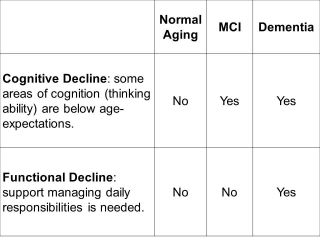Mild Cognitive Impairment
MCI Is Like Being Stuck in the Middle
Mild Cognitive Impairment is between normal aging and dementia.
Posted April 10, 2013
What is MCI?
Mild cognitive impairment (MCI) is often described as being in- between normal aging and dementia, hence being “stuck in the middle”. Like dementia, cognitive decline is present, though not as severe. Like normal aging, people with MCI remain independent in managing daily responsibilities, such as doing the shopping, managing their schedule, and getting around town on their own (though little chinks in the armor so to speak may be present, a subject of a future posting).
A brief definition would be: MCI refers to a decline in thinking abilities, often involving memory, which is greater than expected for normal aging but not severe enough to interfere with a person’s ability to manage their daily activities.

The difference between normal aging, MCI, and dementia
How is MCI diagnosed?
Dr. Ronald Petersen and his colleagues were the first to propose a set of criteria for MCI diagnosis. These criteria are based on behavioral changes and cognitive changes. Behavioral changes might include making more everyday memory slips than is typical for you, such as forgetting to take out the trash or to pay a bill. Cognitive changes would involve evidence of poorer than expected performance, based on your age and education, on a test of cognitive ability. There are no medical tests, like a blood test, that can definitively diagnose MCI. It is a cognitive disorder. If you go on the Mayo Clinic’s website you will see further explanations.
The general criteria for diagnosing MCI are:
- A complaint of cognitive decline
- There is reduced ability in one or more cognitive skills on formal testing, with one of these cognitive skills typically being memory
- Despite objective evidence of some cognitive decline, overall cognitive status is judged to be intact
- There is no marked decline in the ability to manage daily responsibilities
- Based on the above four criteria, there is no dementia
There are different types of MCI and we will drill down into subtypes and the diseases that may be behind these subtypes in future postings. For now, I’ll just point out that there are amnestic (meaning memory decline is present) and non-amnestic (meaning memory decline is not present) forms of MCI. In our clinic, we most commonly see amnestic forms of MCI and the most commonly suspected cause is Alzheimer’s disease.
Signs and symptoms of MCI
Older adults with MCI make the same kinds of memory slips anyone would, such as going into a room and forgetting what you went there for. One of the differences is when you have MCI you make more slips than you used to or you may find you have to put a lot more effort into ensuring you don’t make the slips.
There are warning signs similar, though perhaps not as pronounced, as the examples provided by Dr. Troyer in her last posting under the heading “What’s not normal?” Examples of warning signs for MCI might include:
- Getting lost in familiar places
- Not remembering recent events very well, such as things that happened on a recent vacation or a wedding you went to
- Repeating questions or comments within a conversation or soon after the conversation
- Not remembering the names of people you’ve known for some time
- Others tell you they have noted you seem more forgetful
- Withdrawing from activities because memory problems make them more difficult to enjoy
- Needing a lot of extra time to organize information or complete thinking tasks because of memory problems.
If someone is experiencing these warning signs it is a good idea for them to discuss this with their family doctor. The family doctor can help rule out other potential causes of the problems, help monitor symptoms over time, and refer on to a specialist if further investigation is indicated. In my next posting, I will talk about what you can specifically do, in terms of the next steps, if you are worried you may have MCI.


